

Farm Bureau News
Local Farmers Feeding Your Family
Pam Bakerian retires as DFB executive director
Delaware Farm Bureau’s Executive Director, Pam Bakerian, has retired, as of July 31, 2018, to spend more time with her family.
Bakerian said, “I’ve had the opportunity to support and protect agriculture through my legislative experience, as executive director and through the DFB Foundation,” she said. “We have launched programs that truly have a direct impact on Delaware farm families.
“I have served the organization well. I have set a strong foundation and leave knowing I have prepared you for success. I wish you well.”
Before accepting the full-time position at DFB in 2010, Bakerian represented the 29th District (west of Dover) in the General Assembly for 10 years. She was able to get an amendment passed that exempted farmers from paying state inheritance taxes. She also co-sponsored, with Sen. Nancy Cook, legislation allocating $10 million annually from the transfer of realty taxes to permanently fund agland preservation. As chair
of the tax ditch task force, she pushed for reformed tax ditch requirements, including listing tax ditch right of ways on deeds.
Bakerian helped take DFB into the world of social media. Serving as PR director while still a State Representative, she created DFB’s first Facebook account and updated the website. An e-digest now goes out weekly to farmers with news about the industry, and associate members receive “Fresh From the Farm Bureau,” an email newsletter with recipes and information that encourages them to “buy local.”
Five years ago, Bakerian was instrumental in launching the Delaware Farm Bureau Foundation, a 501(c)(3) non-profit organization whose mission is to build awareness, understanding and positive public perception about Delaware’s farm operations, promote fresh local food and sponsor the Ag Education Mobile Classroom.
The foundation’s first project developed from New Castle County farmer Scott Unruh’s desire to raise funds for milk for the Ministry of Caring. The annual 5K Milk Run, which resulted has raised $69,000 for the Ministry of Caring and additional funds for the Neighborhood House.
Bakerian personally negotiated the donation of a trailer from Delaware Department of Agriculture to launch the “Ag Education Mobile Lab” program and raised the funds necessary to purchase a new truck to haul it. More than 10,000 students have participated in the Ag Lab experience. The Ag Lab is now able to visit schools year round, thanks to a grant from the Longwood Foundation which funded air conditioning and heat.
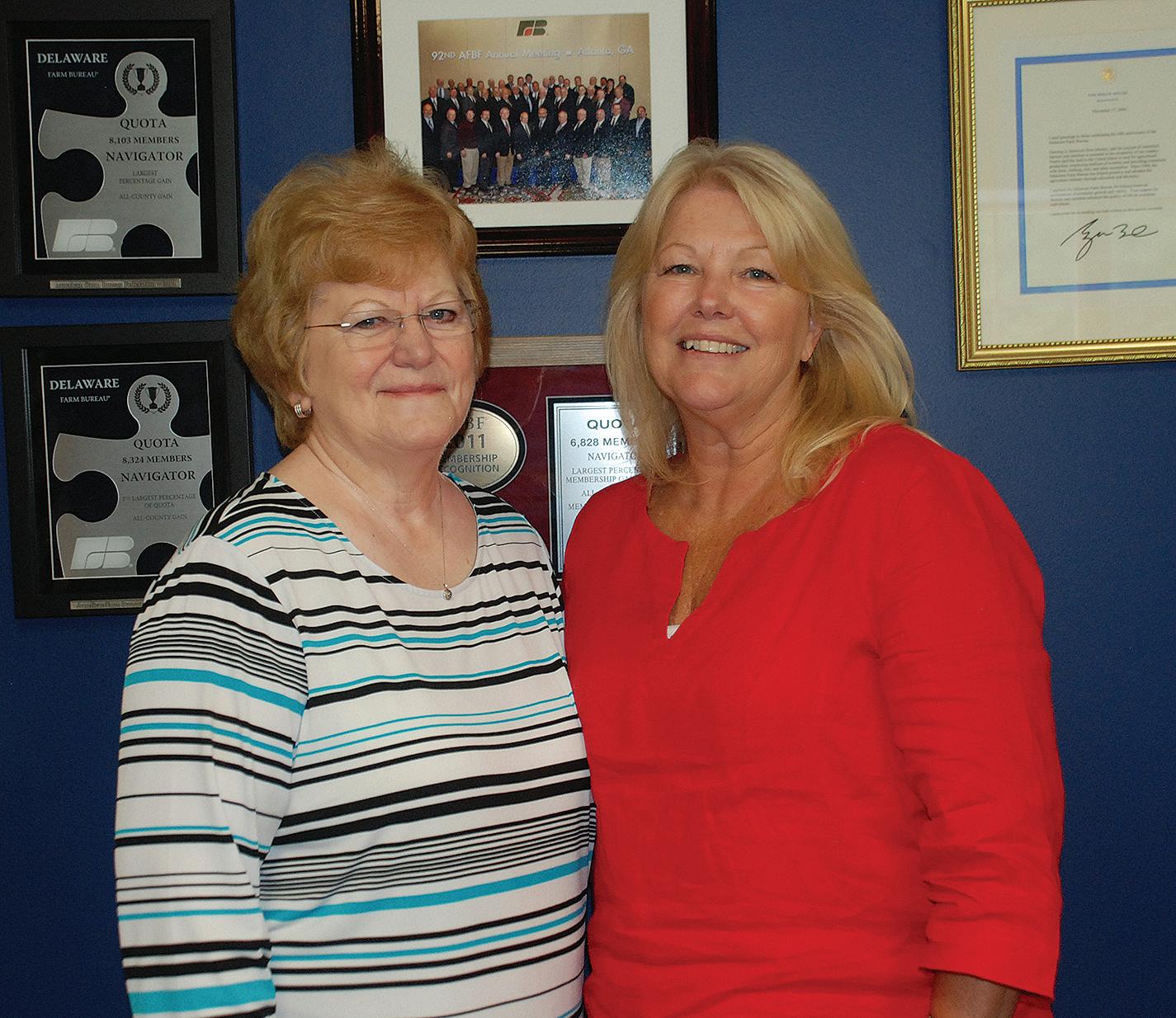
Delaware Farm Bureau President Kitty Holtz bids a happy retirement to Pam Bakerian at the end of July.
“The challenge for the next director will be to expand the Ag Lab program to reach children with ag accurate materials throughout the state,” Bakerian said. She also hopes the foundation will be able to hold a conference for teachers to enable them to take agriculture into the classroom.
In the past year, Bakerian has shared with state officials the impact that an increasingly large deer population is having on farms. Officials have held stakeholder meetings to discuss crop damage and have issued a new deer management program with expanded opportunities for hunting.
Bakerian worked with DFB’s Transportation Committee to resolve the problem of stolen farm tags being used for illegal purposes. When Farm Vehicle (FV) tags were introduced, she personally asked Jennifer Cohan, secretary of the Delaware Department of Transportation, to allocate the first 10 tags to be sold at auction at various times by the DFB Foundation.
Bakerian has been recognized for distinguished service to agriculture by the state Legislature,
Bakerian help bring in non-dues income, including two $50,000 grants to promote specialty crops, with a third grant still in the approval process. Over the past 10 years, she said, “DFB has received a total of more than $240,000 in grants.”
From the President's desk ...
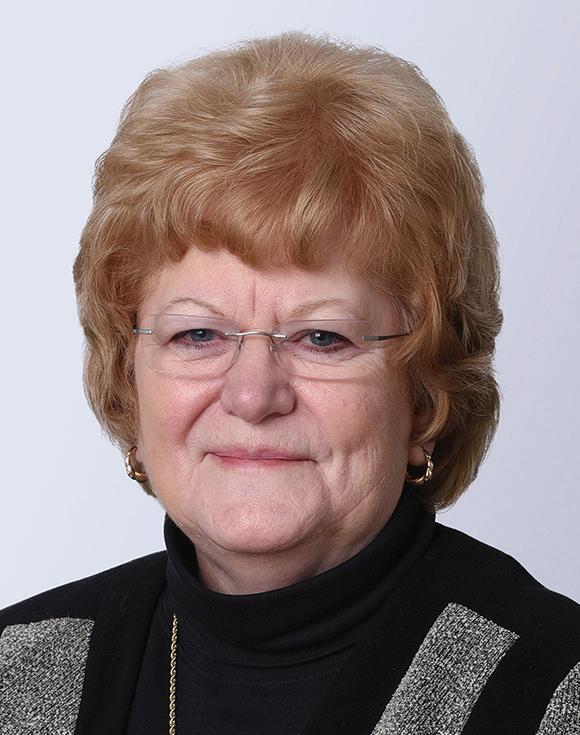
The labor situation on many farms has reached a crisis level. Ask almost any farmer to name his or her biggest problem, and the answer is labor. Jobs in the agricultural industry are physically demanding, performed in all kinds of weather, and often the need for help is only seasonal. Most U.S. residents seeking employment are not interested in or willing to undertake such work. Farmers and ranchers are forced to rely on foreign workers under a government-sponsored temporary worker program known as H-2A, but multiple regulatory changes and rigid program administration have made use of an already difficult program nearly impossible.
The non-agricultural H-2B-visa program is capped at 66,000 workers annually, and because of that,
Chesapeake Bay crab companies have been scrambling to find pickers this summer.
American Farm Bureau Federation strongly supports Congress passing legislation that addresses agriculture’s labor needs.
Last October, the House Judiciary Committee reported HR 4092, the AG Act. That measure established a new H-2C guest worker program for agriculture. Many of the elements of that program represented significant improvements over the current H-2A program. They included granting USDA a principal role in administering the program, broadening the program to all of agriculture (including dairy), setting a wage floor that is closer to market conditions, establishing an “at-will” program, reducing recruitment obligations on employers, reducing bureaucratic hurdles and eliminating expensive provisions that make H-2A unattractive.
Despite these improvements, however, the bill did present significant challenges; they included the visa cap, how current workers would be treated, a health insur-
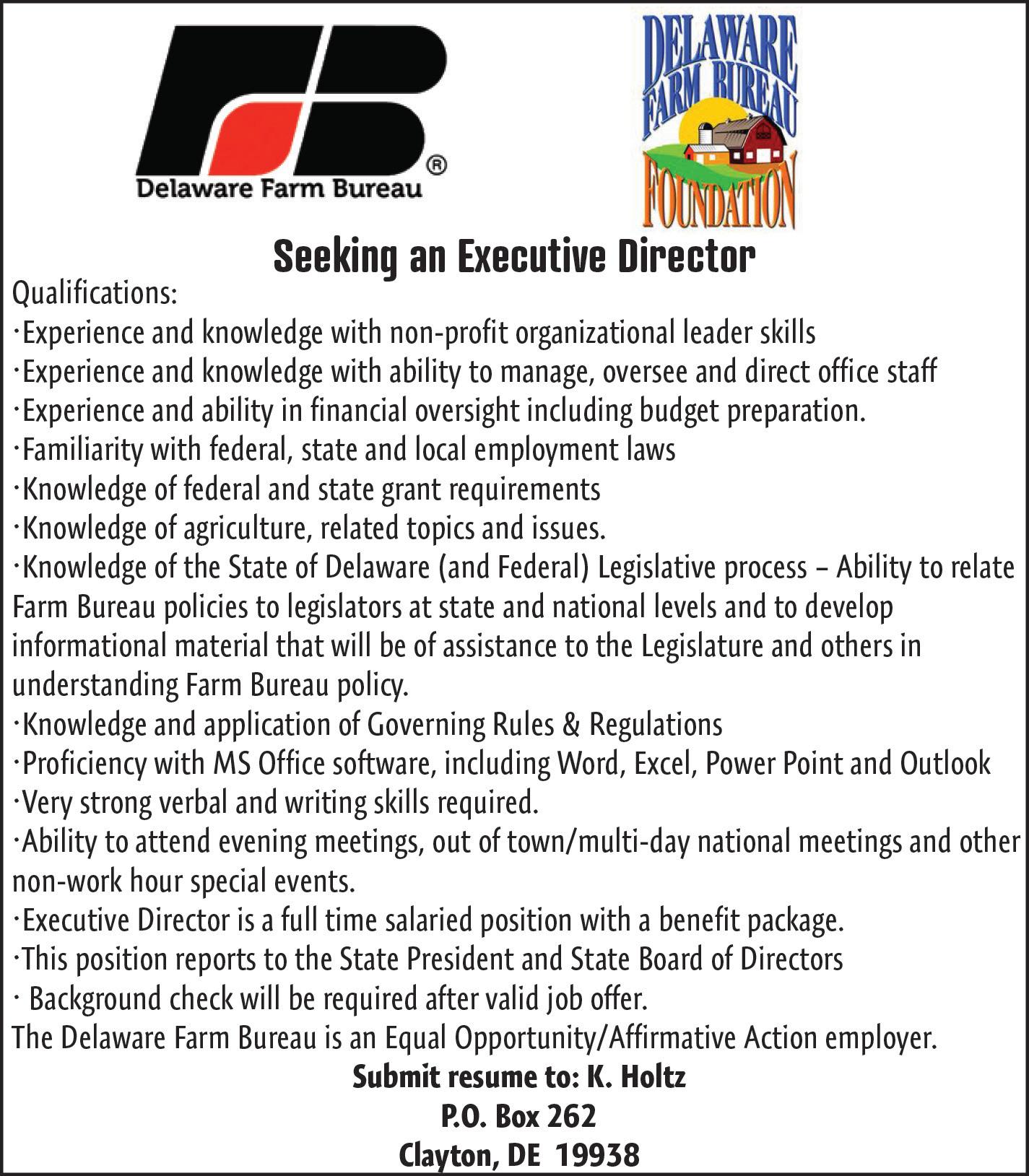
ance mandate on workers, and a “touchback” provision that left in doubt how many workers would actually come forward to participate in the new program. AFBF did not support HR 4092 as reported from committee.
On July 18, House Judiciary Committee Chairman Bob Goodlatte (R-Va.) introduced H.R.6417, the "AG and Legal Workforce Act," which now has 79 co-sponsors, including three Democrats. The bill will now be considered in committee.
According to a press release from the House Judiciary Committee, the H-2C program “is available to both seasonal and year-round agricultural employers, provides a generous visa allocation to ensure labor needs are met, provides much needed flexibility to minimize disruptions in farm operations, eliminates regulatory burdens, and contains effective accountability and enforcement provisions.”
The bill also requires all U.S. employers to use E-Verify, a webbased program that would replace the paper-based I-9 system.
Chairman Goodlatte said, “The agricultural community has waited far too long for a workable guestworker program and it’s past time to enact a solution.”
Congressman Michael Conaway (R-Texas), said, “We need an ag worker program that respects our nation’s immigration laws and
keeps American agriculture competitive. This bill takes important steps to cut red tape and institutes a flexible program that accounts for the different labor needs of various producers.”
American Farm Bureau and some 200 other ag groups support House passage of the AG Act. However, AFBF strongly opposes mandatory E-Verify in the absence of an effective guest worker program for agriculture.
Farm Bureau continues to dialogue with Chairman Goodlatte in an effort to seek further improvements in the measure, principally as they relate to current workers. We will continue to advocate for stronger provisions that will allow current workers the opportunity to gain permanent legal status. Should the House pass the AG Act, we will work actively in the Senate to strengthen the provisions as they affect our current workers. What is certain is that if the House fails to pass legislation, the issue will be dead – not just for this Congress but possibly for years. That outcome is unacceptable. Farmers and ranchers need a solution and Congress needs to act. These chances don’t come often. Ag labor was last seriously debated in Congress in 2013, in 2007 and before that in the 1990s.
AFBF has been seeking legislation on this issue for at least 20
Delaware Farm Bureau News Editor
Carol Kinsley carol.kinsley@defb.org Graphics/Production Designer
Heather Kline heather.kline@defb.org 302-697-3183
Place your ad in the Delaware Farm Bureau News and reach nearly 8,000

Delaware Farm Bureau News (ISSN 10770798), published in Camden, DE, bimonthly, by Delaware Farm Bureau. Production by Delaware Printing Company. Periodicals postage paid at Camden, DE and additional offices.
Business and Editorial Offices: 3457 S. DuPont Highway, Camden, DE 19934, 302-697-3183.
Any editorial material may be reproduced with credit to this publication.
POSTMASTER: Send address changes to Delaware Farm Bureau News at the office above.
Subscription price to members (paid as part of Farm Bureau membership dues) is $1.60. All other subscriptions are $6.50 per year.
Delaware Farm Bureau
President Kitty Holtz
Dairy Revenue Insurance to be available Oct. 9 from AFBIS
A new dairy insurance service from American Farm Bureau Insurance Services will bring an extra level of support to a dairy sector that has been battered by losses over the past four years.
AFBIS’ Dairy Revenue Protection insurance policy, available by early October, covers potential revenue loss over five quarterly insurance periods.
The insurance product was developed by AFBF Chief Economist John Newton in partnership with AFBIS and economists from the University of Minnesota and Cornell University. It fills a demand not met by previous products.
“Farmers have been suffering, and dairy farmers especially,”
AFBF President Zippy Duvall
said. “The number of dairies that have had to close or sell to larger operations is shocking. We have always known revenue protection insurance could help farmers weather this storm, but no one offered it. That’s why AFBIS is stepping up and rolling out this insurance now, when the need is so great. We appreciate the support from the Agriculture Department and look forward to the rollout by Oct. 9.”
USDA officials support the move toward revenue insurance for dairies. “Expanding the federal crop insurance program to markets that need it is key to an effective farm safety net. Because of cooperation with partners like the AFBF, we are able to offer this new prod-
Pam Bakerian retires ...
CONTINUED FROM PAGE 1
Kent County Levy Court, New Castle County and, during this year’s Delaware State Fair, by the governor and DDA.
After so many years of supporting Delaware farmers, Bakerian said she did have regrets about retiring. “I will regret losing touch with so many special people I
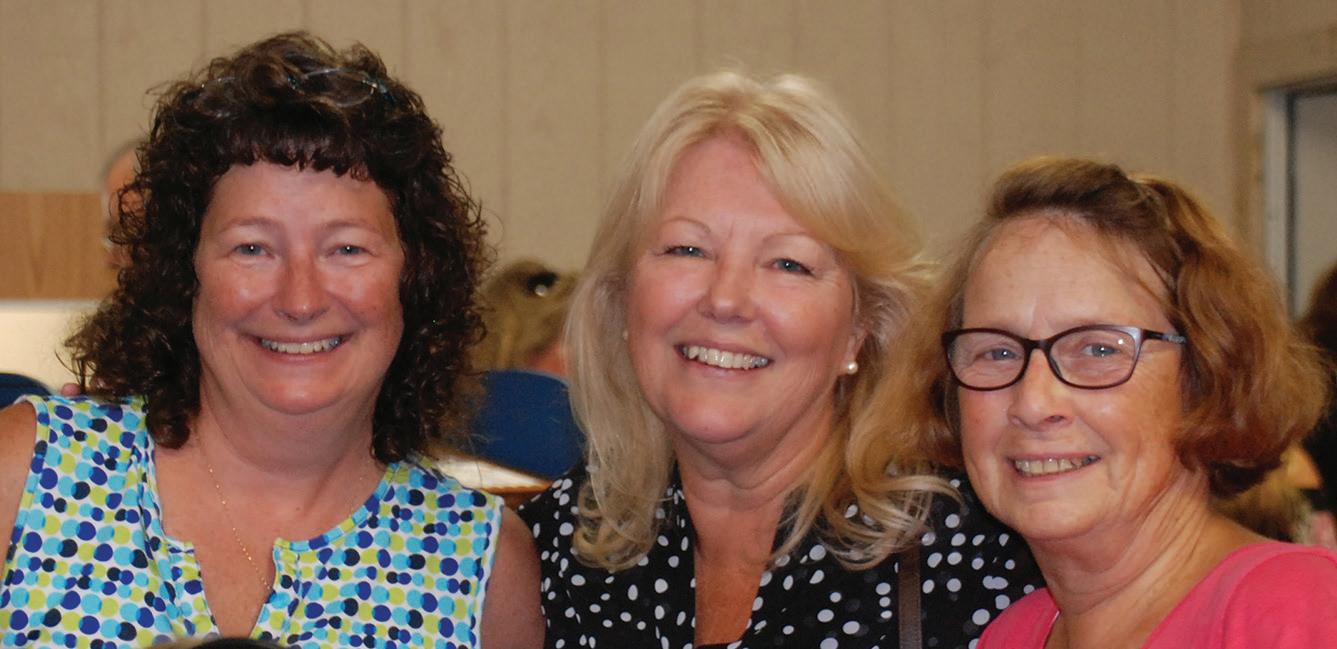
have had the privilege to work with over the years. There are so many people from American Farm Bureau Federation, county Farm Bureaus, state Farm Bureaus, Nationwide representatives, government officials, the business community and Delaware Farm Bureau members who have supported and assisted me in achieving goals and objectives I could not have achieved alone. The past years have been very rewarding.”
Delaware Farm Bureau is seeking a new executive director.
uct in a way that it can be flexible based on the needs of dairy producers,” said Bill Northey, Under Secretary, Farm Production and Conservation.
Dairy farmers will have the option to select between class or component pricing options. The class pricing option uses an average of Class III and Class IV milk prices based on the insured’s declared class price weighting factor. The component pricing option uses butterfat, protein and other solids
prices, as well as the declared butterfat and protein test to determine an insured component value of milk. Pricing options allow farmers to customize their price elections more accurately according to individual price risk.
Coverage options start at 70 percent and are available up to 95 percent, in 5 percent increments.
For more information, visit www. dairyrp.com and www.fb.org/market-intel/dairy-revenue-protection-is-here.
President's desk ...
CONTINUED FROM PAGE 2
years. The labor shortage in agriculture is acute and only getting worse. While the AG Act may fall short in some respects, it has enough positive elements to provide a sound foundation on which we can build in the Senate and we urge all members to vote in favor of the legislation.
Our success depends on Farm Bureau members like you to answer the call. You are part of the solution and the reason this im-
portant bill can pass in Congress. Please contact your representative today. The Speaker of the House has said he will schedule this bill for a vote in September if enough members show their support. Delawareans can contact Congresswoman Lisa Blunt-Rochester via email by visiting https://bluntrochester.house.gov/contact/. Or, call her Washington, D.C., office at (202) 225-4165; Wilmington office, (302) 830-2330, or Georgetown office at (302) 858-4773.
Jan Cartanza, left, and Delaware Farm Bureau Vice President Laura Hill, right, were on hand to see Pam Bakerian receive an award at the Delaware State Fair in her last week as executive director.
Details on the position requirements and how to apply are included in this edition of Delaware Farm Bureau News.

Young exhibitors shine at Livestock Extravaganza
At the 99th Delaware State Fair, in the 14th annual competition to select overall champion livestock showman during the Livestock Extravaganza, overall showmanship champions selected in each of four market species shows com-
pete, demonstrating their skills in showing all four species.
Cole Olsen, age 15, of Pocomoke, Md., took the honors as “champion of champions,” competing against Miranda Hunter, CONTINUED ON PAGE 5
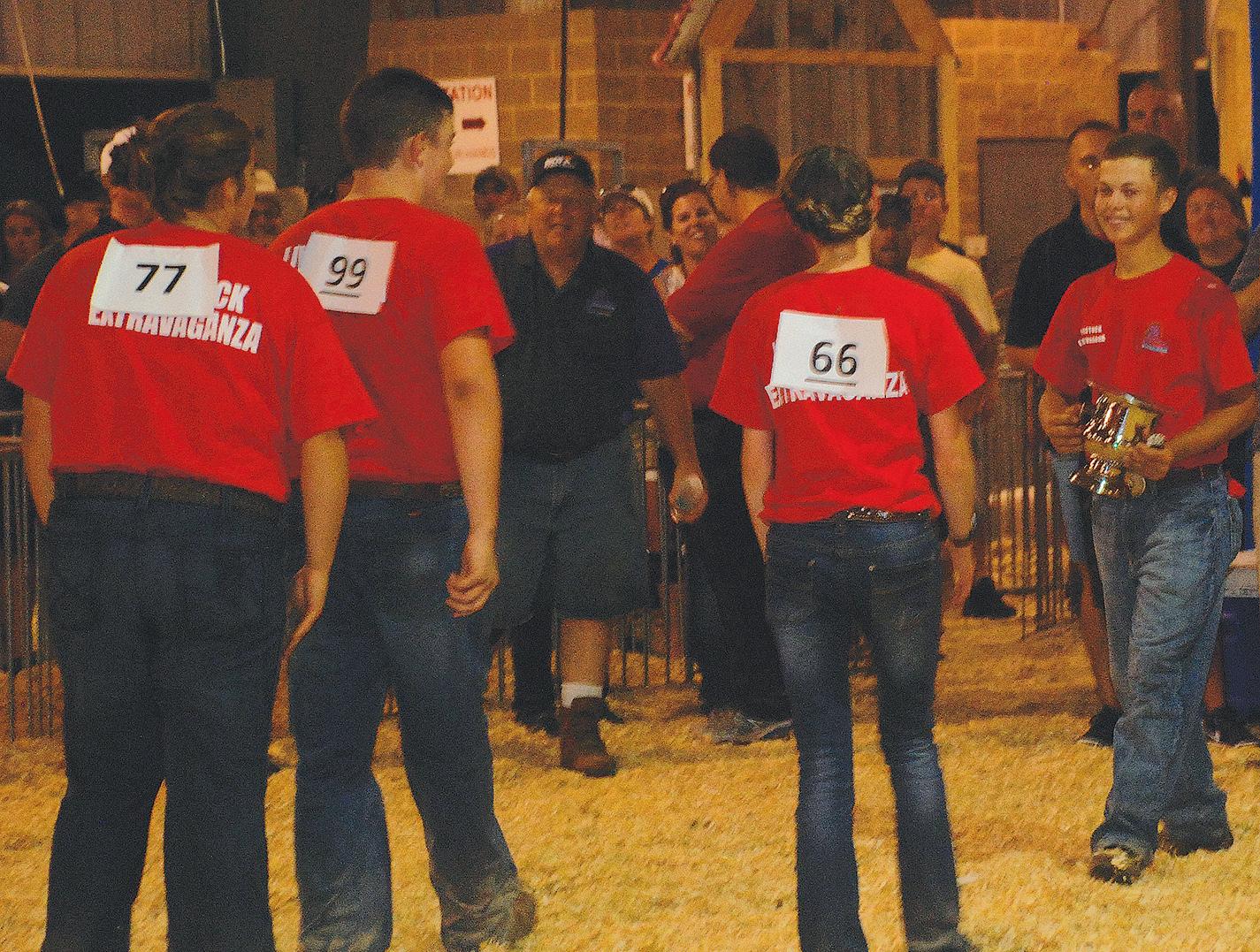

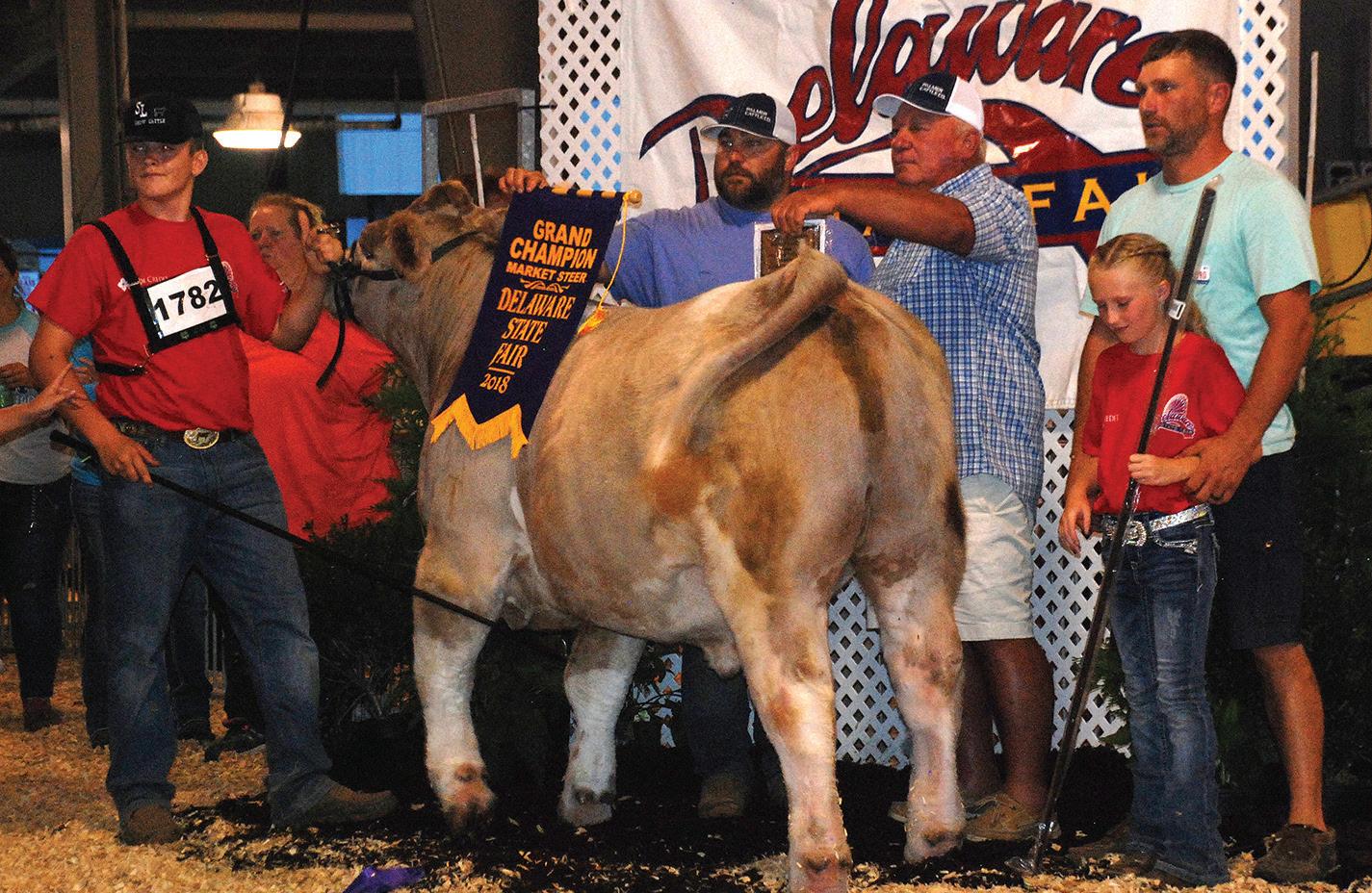
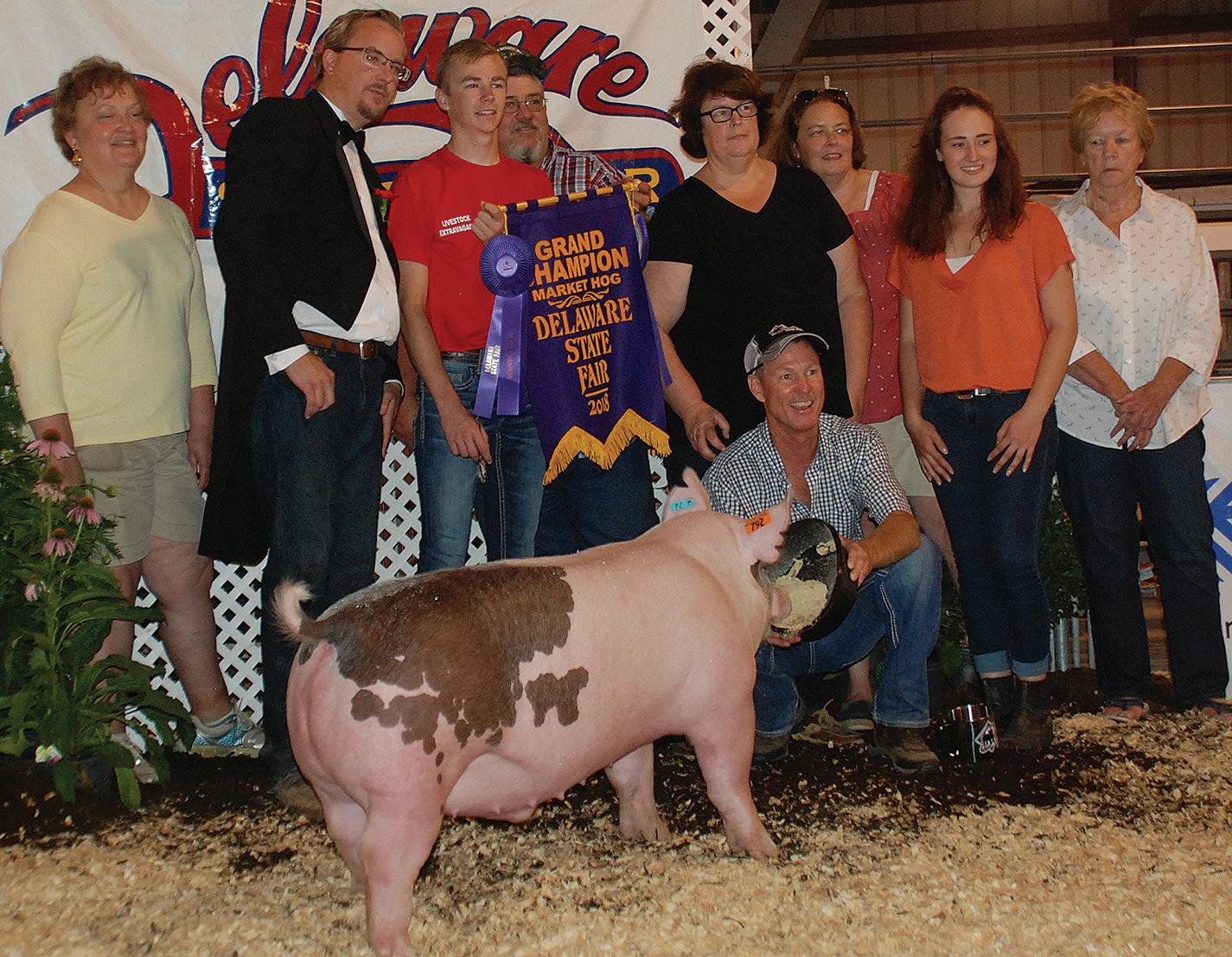
New Youth Ambassador selected
Helena May Kirk, daughter of Deborah and Wyllis Kirk of Townsend, has been selected Delaware Farm Bureau Youth Ambassador for 2018-2019. Her mother was 1991 Delaware Farm Bureau Queen.
Kirk is a senior at Middletown High School and is active in FFA, 4-H, church, wildlife and deer management groups and the National Rifle Association. She served as 2017-2018 New Castle County Youth Ambassador and represented her high school as Ag Ambassador at the 2018 State Fair.
She plans to study soil science and construction management in college.

Cole Olsen of Pocomoke, Md., right, was named Overall Champion Livestock Showman at the 2018 State Fair's Livestock Extravaganza.
The Grand Champion Steer was shown by Seth Layfield, left.
The Grand Champion Market Hog was shown by Drew Harris, center.
Helena Kirk
Livestock Extravaganza ...
CONTINUED FROM PAGE 4
sheep; Madison Cook, swine; and Seth Layfield, steers.
Master of Ceremonies Mike Scuse, Delaware secretary of agriculture, said 469 head had been exhibited in market categories. The champion and reserve of each of those classes competed in the
Extravaganza including 10 hogs, 22 sheep, 34 goats and eight steers.
The Grand Champion Market Hog was shown by Drew Harris; the reserve by Kassidy Hearn.
The Grand Champion Market Lamb was exhibited by Ridge Betts; the reserve was shown by Drew Harris. Betts also received
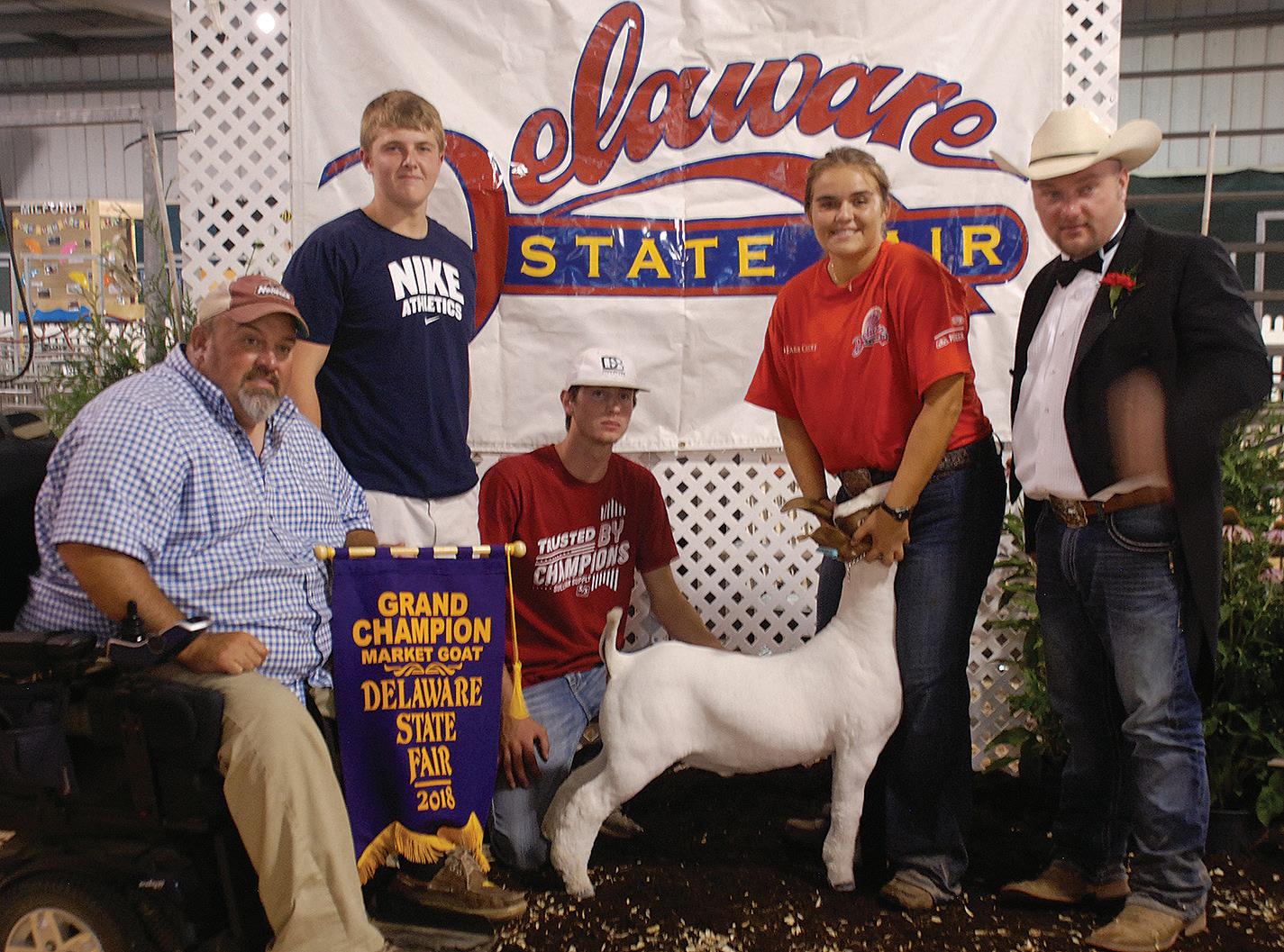
the Sammy Tatman award. This is Betts’ last year to exhibit as a junior, but he is going out with a bang. At the All American Junior Sheep Show in Indiana, he showed the Grand Champion Horned Dorset Ram. He also won the senior division of an essay contest there.
The Grand Champion Market Goat was shown by Madison Cook; the reserve, Kassidy Hearn.
The Grand Champion Steer, weighing 1,300 pounds, was shown by Seth Layfield, who also won the Betty Palmer award. The reserve was shown by Dylan Nickerson.
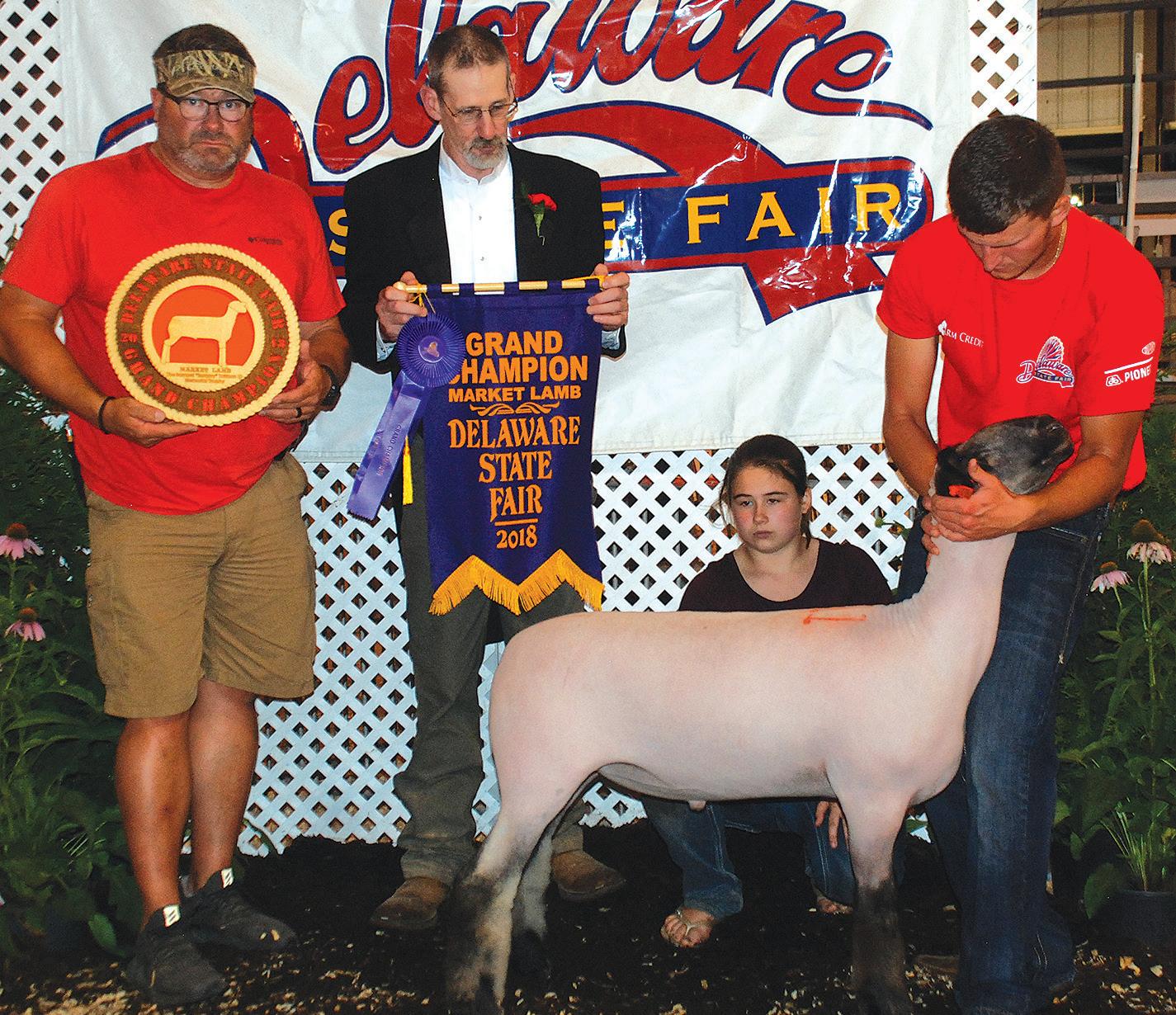

The Grand Champion Market Lamb was exhibited by Ridge Betts, right.
The Grand Champion Market Goat was shown by Madison Cook.
Get cost-share for food safety audits
A Food Safety Audit Cost-Share Program administered by the Delaware Department of Agriculture is designed to assist Delaware fruit and vegetable growers with the cost of a third-party food safety audit. According to DDA, Delaware growers can now receive financial support in obtaining a third-party audit to verify they are following effective food safety practices.
Audits verify that fruits and vegetables are produced, packed, handled and stored in the safest manner possible to minimize risks of microbial food safety hazards.
DDA’s Food Products Inspection Section will pay 80 percent of the cost of a USDA AMS or commercial third party food safety audit, with a maximum reimbursement of $1,000 per year, per farm.
To be eligible for assistance, Delaware fruit and vegetable growers must meet the following requirements:
• Growers must have successfully completed a third-party USDA AMS or commercial audit.
• All paperwork must be submit-
ted to the Delaware Department of Agriculture by Sept. 28, 2018, to be eligible for reimbursement. In the event of limited funds, preference will be given to audits on a first-come, first-serve basis until funds are depleted.
Applicants must fully complete the necessary application and be able to show verification of successful audit completion, billing and proof of payment for the audit.
The application form may be accessed at https://agriculture.delaware.gov/wp-content/uploads/ sites/108/2018/07/SCBG_CostShare2018-Application.pdf.
In addition, the State of Delaware requires all applicants to register in the new State of Delaware eSupplier Portal before payments can be made. If you have previously been reimbursed through the state, your information is still on file, but be sure to update any information in the new portal, as necessary. This portal can be located at https://accounting.delaware. gov/w9_notice.shtml .
For information regarding DDA/USDA AMS food safety audits, contact Brenda Clements,

food products inspection field supervisor, at (302) 698-4546 or via email at Brenda.Clements@state. de.us.
If you have questions regarding the cost-share program, contact Andrea Jackson, food products inspection administration, at (302) 698-4545 or via email at Andrea. Jackson@state.de.us.

Samantha Kirk, former Sussex County Farm Bureau Youth Ambassador, volunteered in the Farm Bureau's booth at the Delaware State Fair. Here, Cheyanne, 2-year-old daughter of Karen and Elwood Story of Lincoln, gets a prize for playing Plinko.
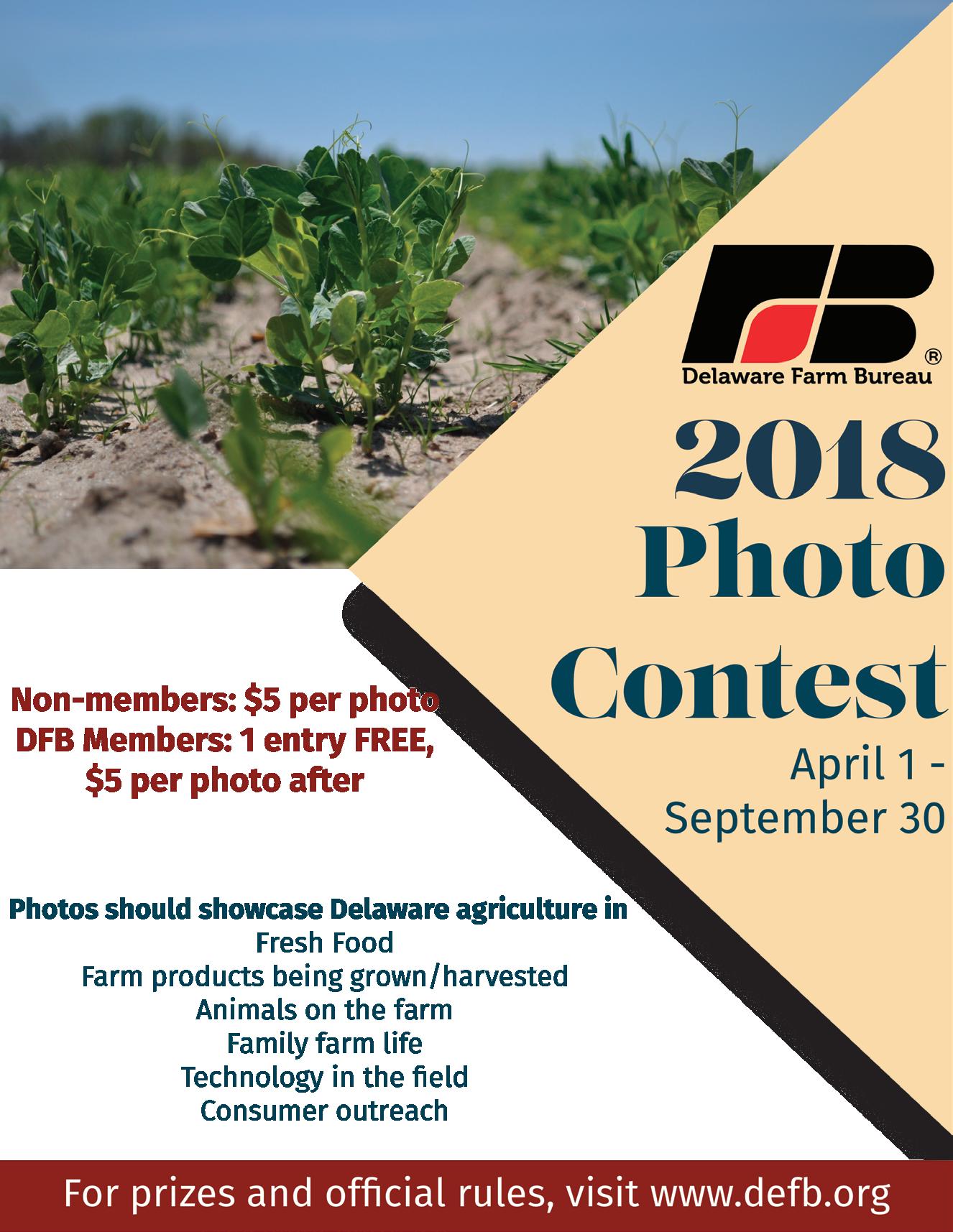
Scenes from 2018 YF&R Tractor Pull


There were 140 hooks at this year's YF&R Tractor Pull at the State Fair — the most ever. At left are Ruby and Dale Phillips.
At right are Kristy Voshell and Melissa Urian, helping out.

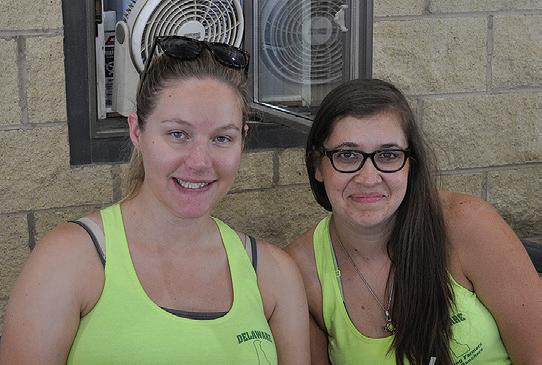
At far right, Rebecca Paoletti, left, Rebecca Babola and Jena Saxton, sold shirts at the tractor pull.
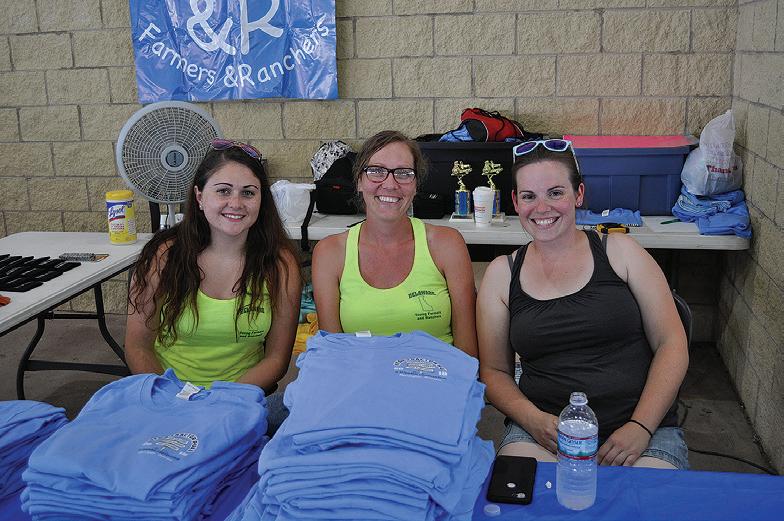
Lettering on the orange stripe identifies this tractor as a 1950 Cockshutt, the same as an Oliver.



In yellow shirts are YF&R members Jacob Urian and Dale Phillips. This Case 600 is owned by Robert and Clark Beall.
Food Booth at fair 'a success'
While the numbers haven't been calculated, the Delaware Farm Bureau food booth at this year's State Fair had a successful year, said Jan Cartanza, DFB staff member who works with the Women's Committee on this major project, and has for years. "The new fryer really helped. It was a good investment!"
French fries are a popular item at the food booth, as are the traditional milkshakes. Having the new fryer kept people from having to wait in long lines for their food.
The profits from this effort go, in part, to fund scholarships for Delaware students. In 2018, $5,500 in scholarships was presented.

Back to back, Connie Fox and Leolga Wright work with FFA volunteers in the Delaware Farm Bureau's food booth at the fair.
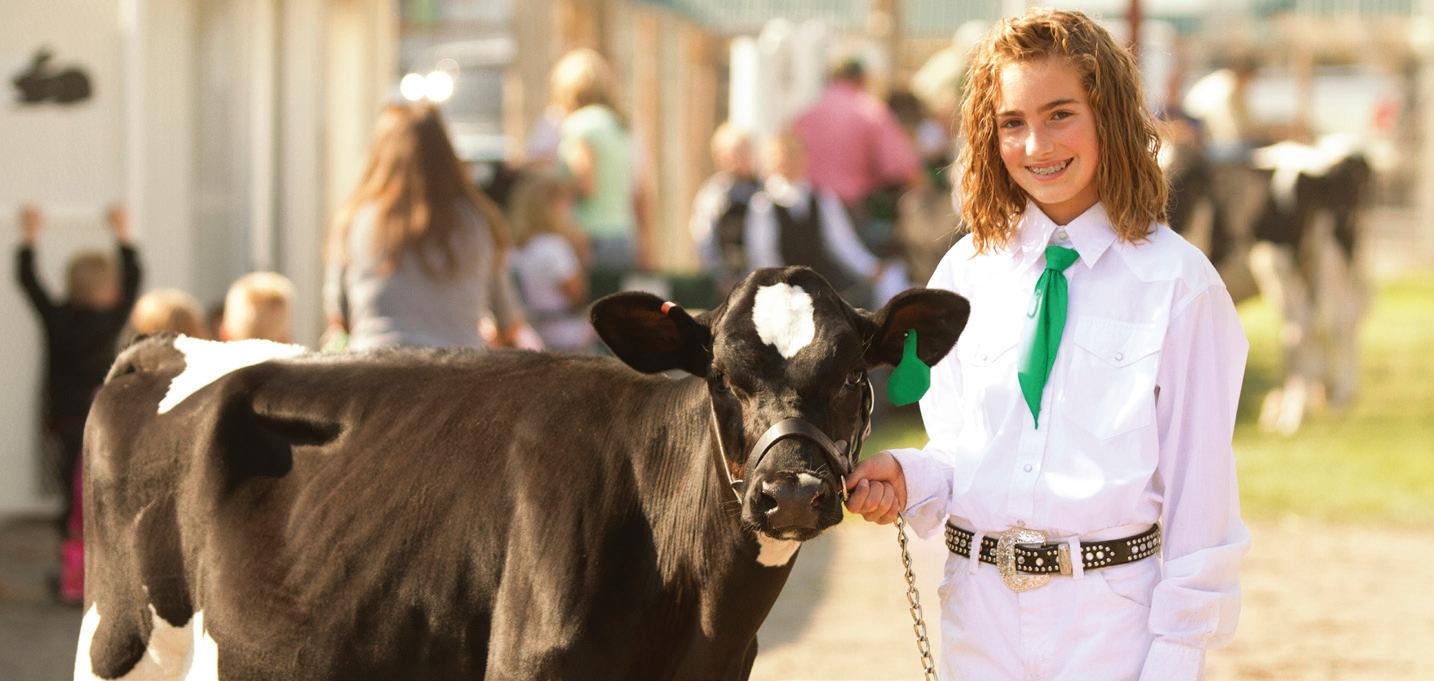
Do people ever ask you why you do what you do?
Farming is hard work. And there are lots of obstacles. We get that. But we also know that you’re doing what you love. And a visit to the fair reminds everyone why agriculture is so important.
There’s nothing we’d rather do than provide financing to the farmers in Delaware. For over 100 years, we’ve been helping rural America grow great things—whether it’s crops, cattle, or kids.
So, give us a call. Together, we can help you keep doing what you love.
Lending support to rural America® 888.339.3334 | mafc.com | Let’s do this.
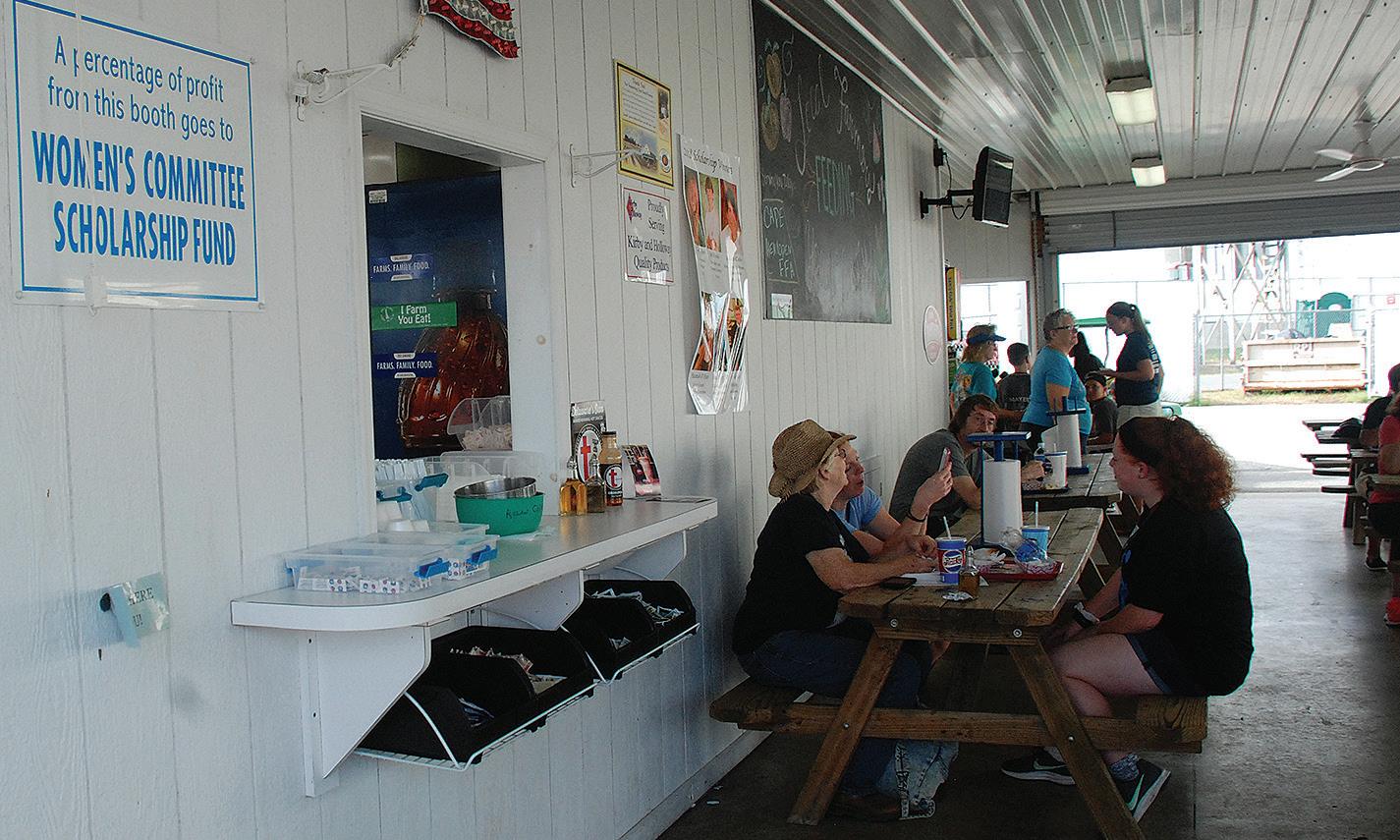
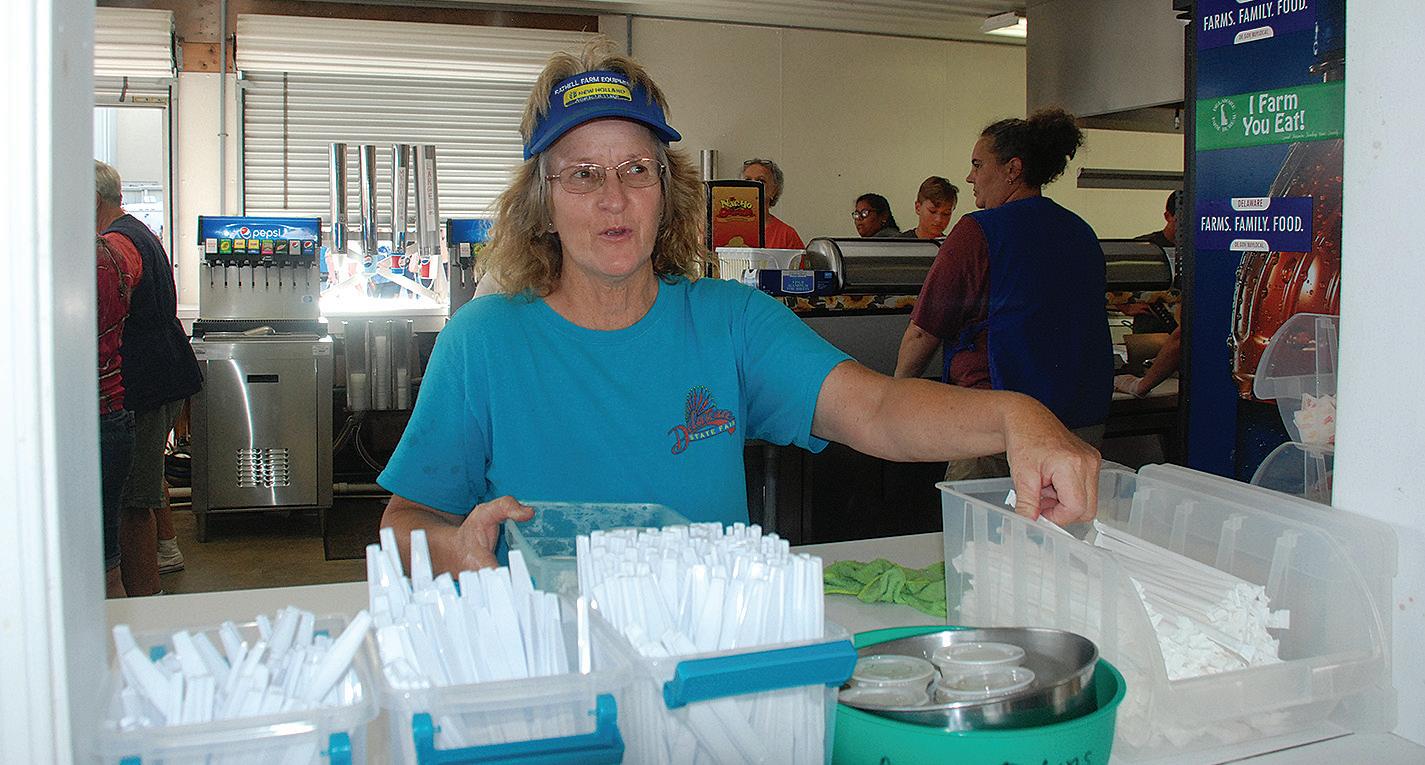
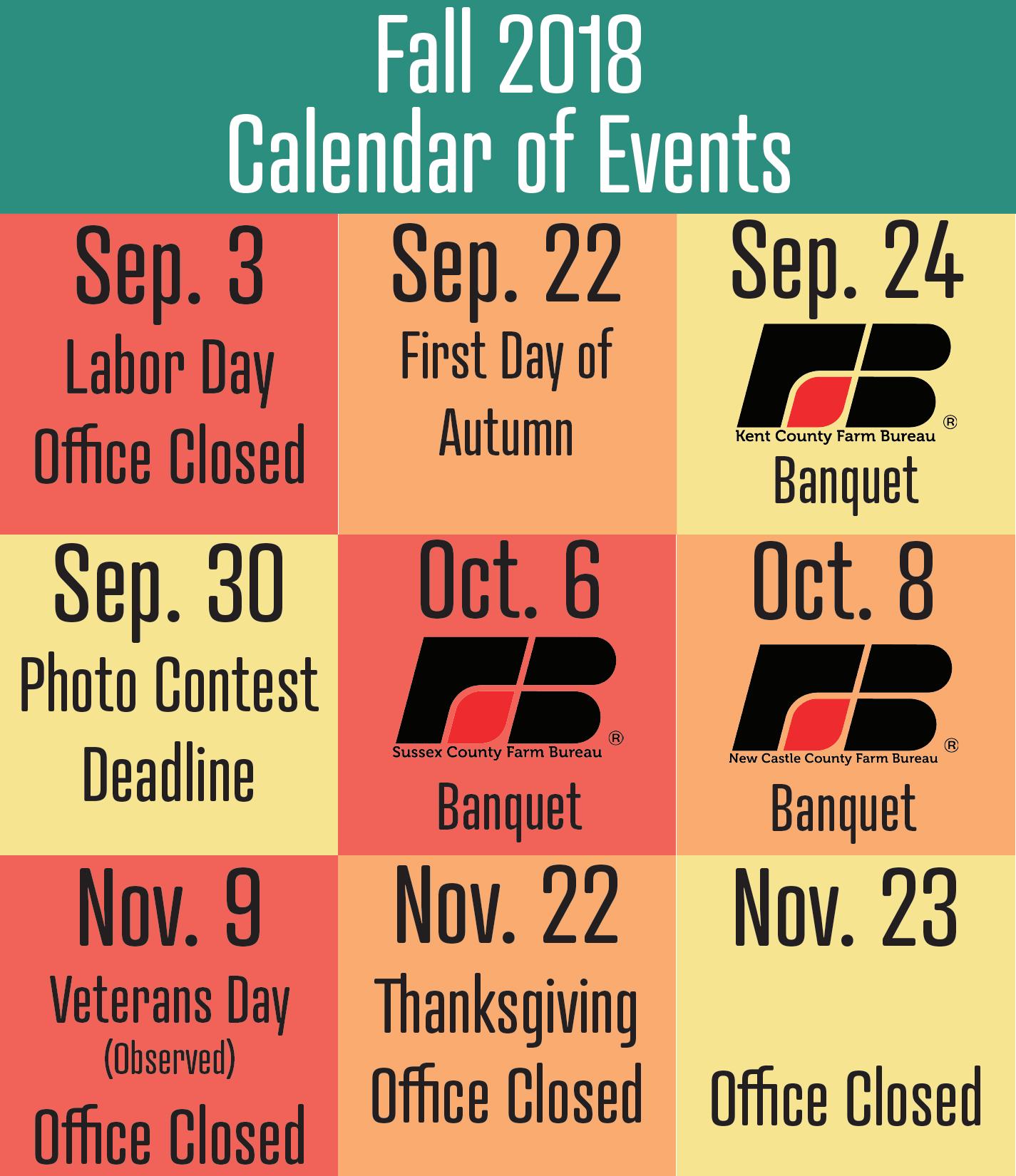
A shady place to sit and eat good food is much appreciated.
Mary Bea Gooden replenishes supplies for customers at the fair.
Forum, webinar to address farmers' access to health care
Delaware Cooperative Extension and several partners have begun a “Linking Farm Vitality and Health Project,” to educate Delaware farmers and other stakeholders about the role that access to health care plays in a successful farm operation.
The project will bring together professionals from the health care, health insurance, government and farming communities to discuss issues and identify solutions in a Linking Farm Vitality and Health Forum on Sept. 20 from 9 a.m. to 3:30 p.m. at the Duncan Center in Dover. A similar forum will be held Sept. 21 at the Doordan Institute in Annapolis, Md.
National experts will share the current research on how a lack of health care access impacts the farming community and update attendees about the current health care community in Delaware. Then, through a facilitated process, attendees will identify needs and solutions to implement locally.
The project is supported by the Northeast Regional Center for Rural Development.
A 2017 USDA study highlighted many alarming figures affecting the health and well being of the farming population, including:
• 45 percent were concerned they would have to sell some or all their farm to address health-related costs;
• 64 percent reported having pre-existing health conditions and were not confident they could pay the costs of a major illness or injury; and
• 72 percent had off-farm jobs for health insurance and financial stability. Additionally, increased use of opioids and an uptick in suicides among farming families raise concern.
These forums will be followed by a webinar, “Strengthening Health and Farm Vitality – Tools You Can Use” on Oct. 24 from 1 to 2:30 p.m.
The national webinar is designed for farm operators, farm risk management personnel, estate planners, certified public accountants, lenders and healthcare professionals. It will help participants better understand the issues and consequences as well as introduce tools they can use as they work with farm clientele. The University of Maryland Extension and University of Delaware Cooperative Extension Smart Choice Health Insurance programs and many oth-
er resources will be highlighted. Resources will be posted on the HiredNAg.net website. Register in advance at www. eventbrite.com/e/strengthening-health-and-farm-ranch-vitality-tools-you-can-use-tickets-48219795707.
DNREC introduces new deer plan
A new plan for managing Delaware's deer population was introduced at a recent meeting of the Advisory Council on Wildlife and Freshwater Fish held July 31. The plan includes a new Extreme Deer Damage Assistance Program to permit hunting in summer on farms where deer harvest quotas and other measures have been met.
Hunting also will be allowed on additional Sundays Sept. 1 through Jan. 31 except in certain areas.
In a brief interview later, Dave Saveikis, director of Delaware Department of Natural Resources and Environmental Control's Division of Fish and Wildlife, suggested farmers "need to start thinking about deer management like they do pest management and nutrient management."
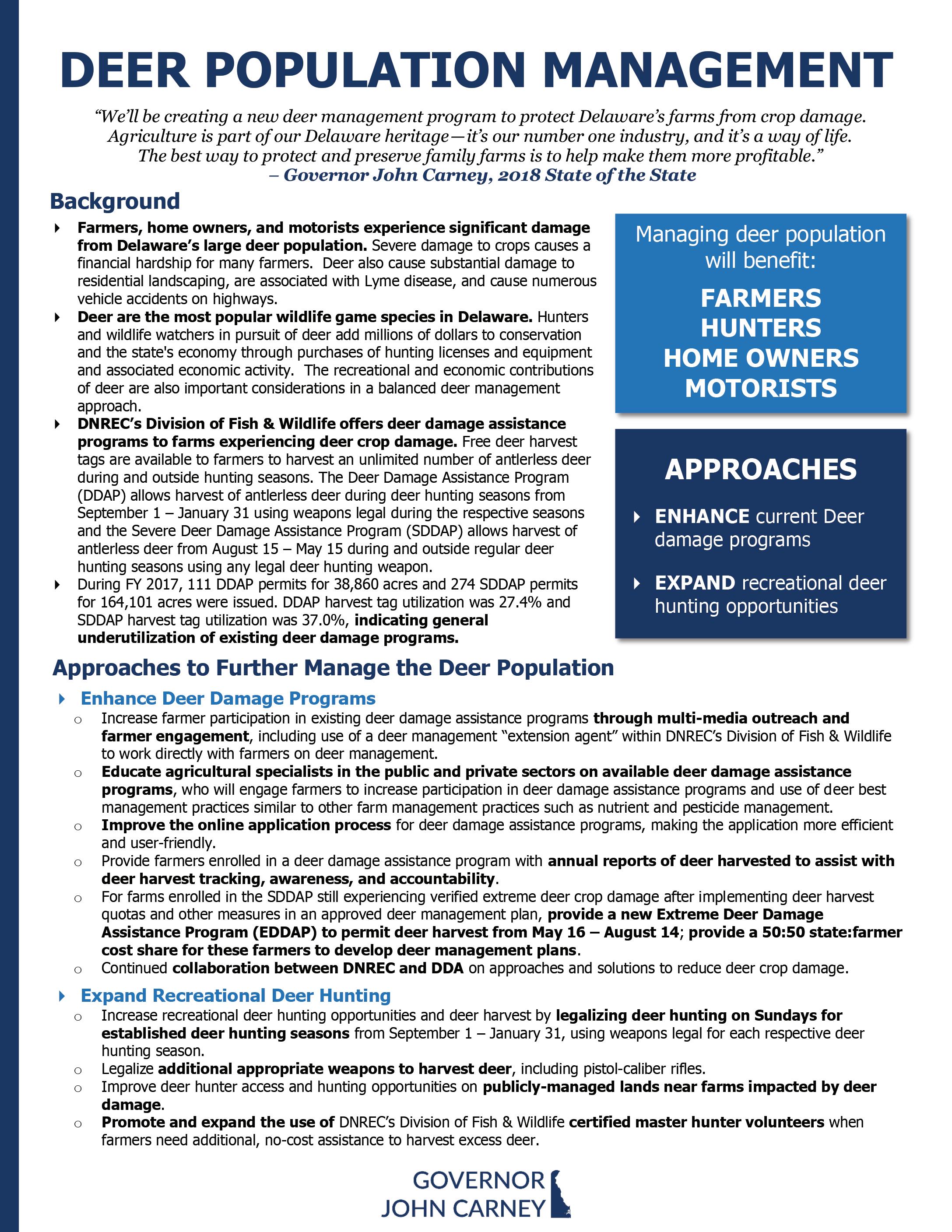
Bakerian, Vanderwende receive awards at State Fair
During this year’s Delaware State Fair, Pam Bakerian was recognized by Delaware Department of Agriculture for her service to agriculture as a state representative and as executive director of the Delaware Farm Bureau.
Gov. John Carney said, “Pam is a delightful person to work with. We work to protect and preserve agriculture and Pam is a big part of that. Thanks, Pam. We appreci-
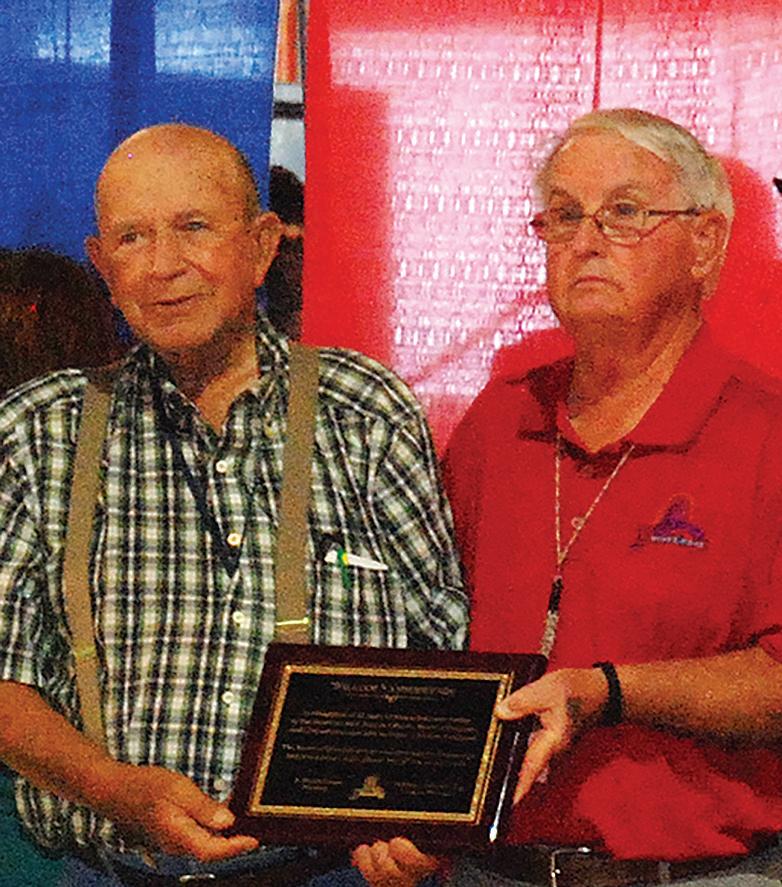
ate everything you do.”
In the same ceremony held in the Ag Commodities Building on July 26, Dot Connelly Abbott was presented the American Tree Farm System Leadership Recognition Award in recognition of her chairmanship of the Delaware Tree Farm Program Committee from 2013-2017.
Paul M. Petrioschchenko, USDA Natural Resources Conservation Service assistant state conservationist for Delaware, received an award in recognition of his efforts “to secure more than $50 million of NRCS funds to support Delaware’s Aglands Preservation Program.”
Just before the Livestock Extravaganza kicked off on July 24, William Vanderwende of Bridgeville was honored for 42 years of service to the Delaware State Fair and to the ag industry.
Nominated to the fair board of directors in 1976, Vanderwende has served as a vice president and as the superintendent of the dairy department for decades. He grew up on a farm directly Ron Draper, right, president of the Delaware State Fair, presents an award to William Vanderwende.

Specializing in commercial solar system development for farming operations in Delaware and New Jersey. The goal is significant, long term, electricity savings.
A solar system is a proven tool to reduce poultry farm operational business expenses to help farmers remain competitive locally, regionally, and globally.
Luminous will manage the process from site assessment to operation & maintenance. Contact Luminous to schedule a site visit and for a brief discussion with no obligation to see if solar is the right fit for your farming operation.
Luminous will work to help obtain:
• A USDA REAP grant to defray solar system cost
• A competitive SREC price for income generation
• Low interest, long term financing terms
andy@luminoussolar.com
Direct: 302-547-7607
Office: 888-282-3556
www.luminoussolar.com
Delaware and New Jersey
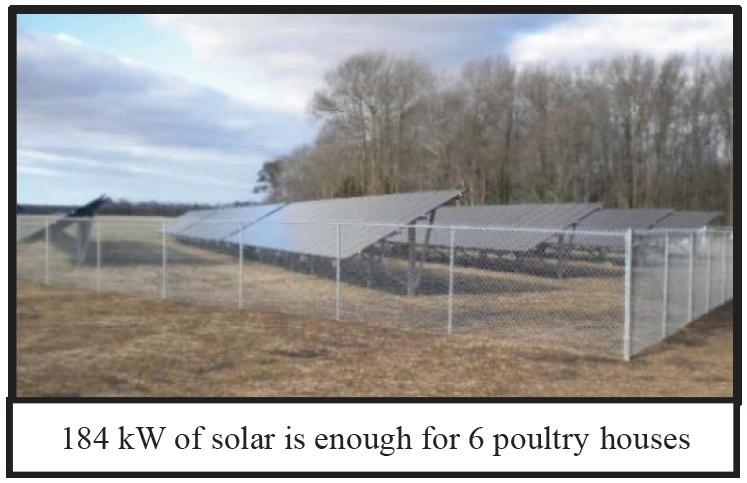

Pam Bakerian received a "Certificate of Recognition" from the Delaware Department of Agriculture for her service to agriculture as a State Representative and as Executive Director of the Delaware Farm Bureau.
behind the fairgrounds and showed cattle there as a teenager. He married his high school sweetheart in 1951 and three years later relocated his family and dairy to a 50acre farm on Route 404 near Bridgeville, a site now well known to beach goers who stop to buy homemade ice cream.
Vanderwende passed on his love for the fair to his four children, 10 grandchildren and 11 great grandchildren — most, if not all of whom were in attendance.
Fair Vice President Ken Clark Jr.
said, “Bill Vanderwende has put his heart and soul into the Delaware State Fair nearly his entire life… He truly loves the Delaware State Fair, and the fair is forever indebted to Bill for his lifetime of giving and service.”
On hand for the presentation, Gov. John Carey added that Vanderwende was one of the people you think of when you think of Delaware agriculture, and that for Vanderwende, “there is no greater blessing he enjoys than his family.”
DDA reminder: Don't irrigate the roads
The Department of Agriculture is reminding Delaware farmers to make sure your irrigation systems are not spraying water onto our state highways and roads. Wet roadways reduce pavement friction that creates a hazard for motorists, especially for motorcycle riders. Check your pivots and make adjustments. You don’t want to be the cause of a crash.

Farm equipment, depreciation and the new tax law
The following information is provided by Nationwide®, the #1 farm and ranch insurer in the U.S.
Buy, lease or hold the old? The changes in tax law will impact decisions you as a farm operator make over the next several years. These decisions may center around farm equipment, livestock and other assets that depreciate.
The new law revised the rules around depreciation, and it will allow full and immediate expensing for purchases over the next several years. The new law, however, ended like-kind exchanges (the replacing of a depreciating asset without paying the taxes on the new item) and that can affect the
way you approach your personal property, such as equipment and livestock and the taxation of these assets.
The nitty gritty
The rule on expensing and bonus depreciation was changed to permit full expensing of most newly purchased depreciable property used in a farming operation through 2022. Arguably one of the largest changes to depreciation is the expansion of Internal Revenue Code section 179 to allow used equipment to receive the same treatment as if it were “new.”
Questions to ask yourself:
• What type of depreciation makes sense for my operations?
• Should I consider utilizing a
mixture of bonus depreciation and straight-line depreciation?
• What are the tax implications if I have highly depreciated equipment that I need to sell?
What it means for you
From a tax standpoint, farmers will now need to think more strategically when buying and selling farm equipment and other farm items. They may consider alternative methods like using a charitable remainder trust to sell a property to avoid paying tax on the sale.
When thinking about using a charitable remainder trust or other business planning strategies, it’s important to enlist the help of qualified professionals who don’t have a stake in the final decisions. Qual-
ified professionals may include your banker, your accountant, your personal attorney or a financial or estate planner.
If you would like to help in finding a qualified professional to speak with, contact the Nationwide® Land As Your Legacy® team at LAYL@nationwide,com or toll-free at 1-855-529-2729.
Neither Nationwide, nor its employees, its agents, brokers or registered representatives gives legal or tax advice.
Nationwide, the Nationwide N and Eagle, Nationwide is on your side and Land As Your Legacy are service marks of Nationwide Mutual Insurance Company. © 2018 Nationwide LAM-2930AO (04/18)
Meet Your Farmers: Kitty and Dave Holtz
Kitty Holtz, president of Delaware Farm Bureau, grew up “a country girl” — not on a farm but surrounded by farms. Her husband, David, on the other hand, always farmed. He grew up on a farm in New Jersey.
They met in the summer of 1967 which prompted Dave to decide to move to Delaware in 1968. It was nearly 50 years ago that they married and struck out on their own in the farming business.
“Over the years, we’ve felt proud of the fact that we were able to start with nothing, save every penny we could to build and pay for our farm. There were some tough years with a young family – but we did it,” Kitty said. Their current home farm between Clayton and Kenton is 250 acres. They lease another 1,450 acres throughout Kent County.
“We grow grain — corn, soybeans and wheat. Most of the corn and soybeans go to feed the poultry industry,” Kitty said, adding that even if every single acre of farmland in Delaware were planted in corn there wouldn’t be enough to supply the industry.
Both Dave and Kitty are still very actively farming. Dave and Kitty have three children, Cherie, Craig and Brent. Their youngest son, Brent, is a partner in the farm operation. A nephew, Lucas Holtz, works full time for the operation. Chris Bergold (Cherie’s husband), Ruby Holtz (Brent’s wife), and two grandchildren, Jes-
sica Bergold and Tucker Holtz, complete the family. All members of the family have been known to jump in and help in a pinch.
The Holtzes have been Farm Bureau members since 1976. Dave has served as Kent County Director since 1987.
Kitty, who retired as an Admin-
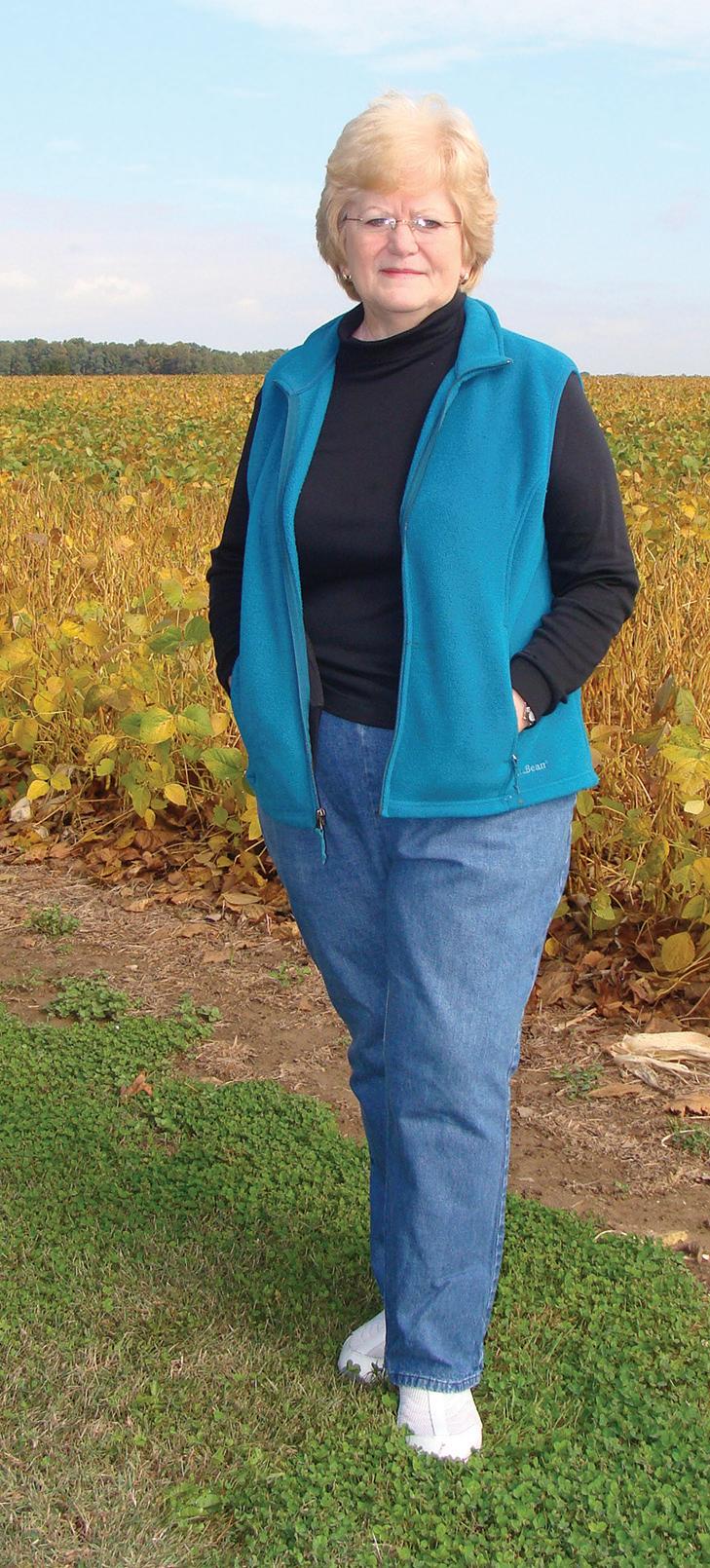
istrative Officer for the Delaware Department of Corrections after 20 years, has also been active in service to Farm Bureau. She served as the Kent County Women’s Committee Chair for eight years; State Women’s Committee Chair for one year; and served on both county and state boards. She
served as Kent County Farm Bureau President for two years before being elected the president of the Delaware State Farm Bureau.
The Holtz family was honored as the Delaware Farm Bureau’s Farm Family of the Year for 2008, after winning the Kent County Farm Family of the Year award.

Kitty Holtz

